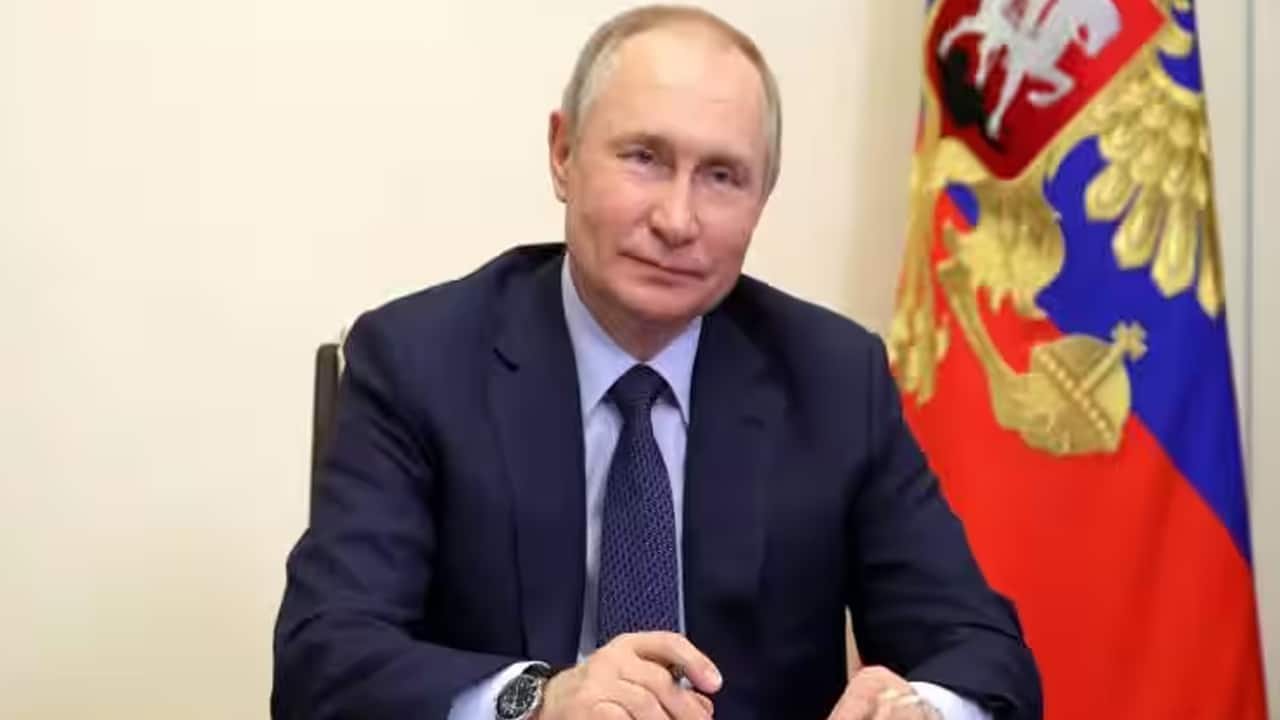




Vladimir Putin
- Ukraine’s SBU Strikes Underwater Pillars of Crimea Bridge with Explosives
Ukraine’s SBU security service said it carried out an underwater attack on a key road and rail bridge connecting Russia to the Crimean peninsula. Using 1,100 kilograms of explosives, the agency claimed to have damaged the bridge's underwater pillars early on June 3. The SBU released a video showing the blast, which Reuters confirmed as matching the bridge’s structure and location, though the time of filming couldn't be independently verified. The bridge is a vital supply route for Russian forces in southern Ukraine. The incident marks another bold strike by Kyiv on infrastructure supporting Russia’s military operations in occupied territories.
- Zelenskyy urges EU, US to impose harsher sanctions on Russia if Istanbul talks fail
Ukrainian President Volodymyr Zelenskyy has called for stronger sanctions on Russia from the European Union and the United States if peace talks in Istanbul fail to produce results. Speaking at the Bucharest Nine Summit in Vilnius, Zelenskyy urged targeting Russian energy, especially oil and tankers, as well as banks and the financial sector. Ukraine’s delegation, led by Defence Minister Rustem Umerov, arrived in Istanbul on June 2 for a second round of negotiations with Russia, following an initial May 16 meeting that resulted in a prisoner exchange deal. The talks are scheduled at the Ciragan Palace, hosted by Turkey.
- Putin visits Kursk region | Ukraine attacks Russia | 30-day ceasefire | U.S.-Ukraine talks | N18G
President Vladimir Putin visited the Kursk region of Russia for the first time since Ukrainian forces seized territory there. Dressed in a military uniform, he visited a control center used by Russian troops and discussed the ongoing situation with Russian military leaders. Putin emphasized the need to defeat the Ukrainian forces entrenched in the region and declared that captured Ukrainian soldiers should be treated as terrorists. Meanwhile, U.S. President Donald Trump earlier announced that U.S. officials were heading to Russia to discuss a proposed 30-day ceasefire and a potential peace agreement, following Ukraine’s agreement to cease fighting after talks with U.S. officials in Saudi Arabia. The Kremlin responded that it was awaiting more details about the ceasefire proposal. Trump expressed hope for a ceasefire but stated that he could apply financial pressure on Russia if necessary, although he preferred pursuing peace without escalating the situation further.
- Putin Hosts Guinea-Bissau’s President Amid Russia-Africa Push | N18G
Russian President Vladimir Putin welcomed Guinea-Bissau’s President Umaro Sissoco Embalo to the Kremlin for key economic and security talks. Russian metals tycoon Oleg Deripaska was present, amid reports that Rusal is eyeing major infrastructure and bauxite projects in the West African nation. Meanwhile, political tensions rise in Guinea-Bissau as Embalo faces opposition disputes and coup attempts.
- Putin says ready to meet Trump 'anytime' to talk Ukraine deal | N18G
During his annual press conference on December 19, 2024, Vladimir Putin addressed a variety of topics, including Syria, Ukraine, and a potential meeting with U.S. President-elect Donald Trump. He denied claims that Russia was failing in Syria, stating that relations with regional powers and groups in the country were strong. Putin also mentioned that many countries expressed interest in Russia maintaining its military bases in Syria. Regarding Ukraine, he claimed Russian forces were making daily progress and taking significant territory, while also assuring that Ukrainian forces in Russia's Kursk region would be removed. Putin expressed readiness for compromise in negotiations over Ukraine and dismissed the idea that Russia was in a weak position. He also noted that he had not met Syrian leader Bashar al-Assad yet but planned to, and would inquire about the fate of missing U.S. journalist Austin Tice. Putin also discussed the Oreshnik missile and potential U.S.-Russia missile experiments.
- Putin Praises PM Modi’s India-First Policy, Says 'Investments In India Are Profitable'
Russian President Vladimir Putin praised India for creating stable conditions for small and medium-sized enterprises (SMEs), drawing a comparison between India’s "Make in India" initiative and Russia’s import substitution programme. Putin expressed Russia's interest in establishing manufacturing facilities in India and emphasized the profitability of investing there. He highlighted the success of Russian brands replacing Western ones in sectors like consumer goods, IT, high-tech, and agriculture. Putin also stressed the importance of stronger Brics cooperation to support SME growth and called for member nations to evaluate key collaboration areas at the upcoming Brics summit in Brazil next year.
- Putin Doubts Trump's Safety Following Assassination Attempts
Russian President Vladimir Putin praised U.S. President-elect Donald Trump, calling him an experienced and intelligent politician but expressed concern over his safety following two assassination attempts. Putin was shocked by the methods used against Trump during the U.S. election, including attacks on his family, which he deemed "revolting." He also speculated that the Biden administration's decision to escalate the war in Ukraine could either assist Trump or complicate his relationship with Russia. Despite this, Putin expressed confidence that Trump would find a solution and reaffirmed that Moscow was ready for dialogue with the incoming U.S. president.
- “Didn’t know she was afraid of dogs…”Vladimir Putin apologises to ex-German Chancellor Merkel | N18G
During a news conference in Astana, the Russian President said he did not know former German Chancellor Angela Merkel was afraid of dogs saying he apologized earlier and wants to repeat his apology again. Germany's Angela Merkel has recalled tricky dealings with world leaders from Donald Trump to Vladimir Putin during her 16-year chancellorship in her frank memoirs, published as her legacy comes under intense scrutiny. "Someone who was always on his guard to avoid being treated badly and always ready to dish it out, including power games with dogs and making others wait for him.
- Putin Lowers Nuclear Strike Threshold Amid Deep Russian Strikes by Ukraine | N18G
Russian President Vladimir Putin has lowered the threshold for nuclear strikes, allowing their use in response to conventional attacks that critically threaten the sovereignty or territorial integrity of Russia or Belarus. This change follows reports that Ukraine used U.S.-made ATACMS missiles to strike deep inside Russia, with U.S. approval. Russia had previously warned NATO that enabling such strikes would be seen as direct involvement in the Ukraine war. Analysts note this marks a significant shift from Russia's 2020 doctrine, which limited nuclear strikes to existential threats. Despite this escalation, the U.S. has not adjusted its nuclear posture. Department of Defense deputy press secretary Sabrina Singh said that the updates to Russia's nuclear doctrine were not surprising and that they are part of "the same irresponsible rhetoric" Russia has engaged in for the past two years. She said that there are currently no indications Russia intends to deploy nuclear weapons in Ukraine, and no changes to the U.S. nuclear posture are deemed necessary at this time.
- Trump urges Putin to avoid Ukraine escalation; Biden readies for key meeting with Trump | N18G
President-elect Donald Trump recently spoke with Russian President Vladimir Putin, advising against escalating the Ukraine war and highlighting the U.S. military presence in Europe. Trump also contacted Ukrainian President Volodymyr Zelenskiy, though Kyiv’s foreign ministry wasn’t informed about his call with Putin. President Biden plans to meet Trump, focusing on a peaceful transfer of power and ongoing commitments in Europe, Asia, and the Middle East. Trump, who has criticised the $174 billion U.S. support for Ukraine, has suggested Ukraine may need to cede territory for peace. He previously claimed he could quickly end the war, without explaining his approach.
- BRICS 2024: PM Modi departs for Kazan, Russia; says India values close cooperation within BRICS
Prime Minister Narendra Modi is visiting Kazan, Russia, from October 22-23 to attend the 16th BRICS Summit, hosted by Russia. The summit's theme is "Strengthening Multilateralism for Just Global Development and Security." Ahead of his arrival, Indian diaspora members have welcomed him with billboards in the city. Modi's visit is at the invitation of Russian President Vladimir Putin and emphasizes India's commitment to close cooperation and reformed multilateralism with BRICS nations. During the summit, Modi is expected to engage in bilateral meetings with leaders from other BRICS countries and invited leaders. This visit highlights the significance of India-Russia relations and the role of BRICS in addressing global challenges. Modi will conclude his trip and return to India on October 23, following the discussions aimed at enhancing collaboration among member nations for sustainable development and security.
- Vladimir Putin's First Visit to North Korea in 24 Years: Strengthening Ties Amid Global Tensions
Russian President Vladimir Putin is set to visit North Korea for the first time in 24 years, deepening ties with the nuclear-armed state amid global unease. North Korean leader Kim Jong Un's invitation marks a significant step in their burgeoning partnership, with agreements on security and economic cooperation expected. This visit comes amid accusations from Washington about military support from Pyongyang to Moscow in the Ukraine conflict, further complicating international relations. Stay tuned for updates on this developing diplomatic story
- Trump Says His Relationship With Vladimir Putin Will Help Free Jailed WSJ Reporter Evan Gershkovich
Former United States president Donald Trump says his relationship with Russian President Vladimir Putin will help free jailed Wall Street Journal reporter Evan Gershkovich. Watch this video for more.
- Vladimir Putin Takes Oath For Fifth Term As Russia’s President | World News
Vladimir Putin commenced his fifth term as Russian leader at a lavish Kremlin inauguration, initiating another six years in power marked by political suppression, conflict in Ukraine, and centralized authority. During the ceremony at the opulent Grand Kremlin Palace, Putin solemnly pledged to defend the Russian constitution as hand-picked dignitaries observed.
- Kim Jong Un Travels In A Bulletproof Train To Meet Putin
North Korea’s leader Kim Jong Un visited Russia to meet President Putin travelling by a distinctive bulletproof train called Taeyangho. Kim Jong Un, his father, and grandfather, used the same train to visit China and Russia. Live lobsters, lady conductors, and conference rooms are some of the features of the train. Watch the video to know more about the bulletproof train.
- EAM Jaishankar Breaks Silence On Xi Jinping & Vladimir Putin Not Attending G20 Summit 2023 In Delhi
External Affairs Minister, Dr S. Jaishankar speaks about Vladimir Putin, President of Russia and Xi Jinping, President of the People's Republic of China not attending the G20 summit 2023. India is holding the presidency of the summit this year.
- Russian COVID-19 Vaccine: Russia says a billion doses of its coronavirus vaccine pre-ordered by nearly 20 countries
Russian COVID-19 Vaccine: The speed at which Russia is moving to roll out its vaccine highlights its determination to win the global race for an effective product, but has stirred concerns that it may be putting national prestige before sound science and safety.
- PM Modi keen on jointly producing weapons with Russia in India for sale to 3rd countries
Modi, the first Prime Minister to visit Russia's Far Eastern city of Vladivostok, is due to hold wide-ranging talks with President Putin on Wednesday ahead of his departure to the Russian port city.
- Russian President Vladimir Putin brings own mug to G20 summit
Videos showed Putin, in power for almost twenty years, drinking from a white thermos mug while other leaders drank from regular wine glasses.
- Vladimir Putin arrives in India today: S-400 defence system, nuclear plant deal on cards
Russia and India are expected to sign the $5 billion S-400 Triumf air defence systems deal along with agreements on security and SME






